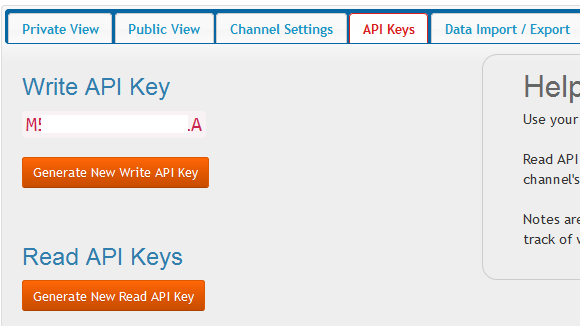Getting started with Open Source Cloud Server Upload any Sensor Data to cloud Server ThingSpeak Complete Tutorial Read, Write with Example¶
ThingSpeak¶
Video Tutorial can be Found Below Link¶
Hard Way Instead Method 2 shows uploading Data with 3 lines of Code¶
from IPython.display import YouTubeVideo
YouTubeVideo('jYeUS7JxmA8')
Easy way¶
from IPython.display import YouTubeVideo
YouTubeVideo('HM7_Urqoric')
%%html
<img src="https://cdn-images-1.medium.com/max/1600/1*sxA4dxPaJEr8julLO494kA.png" , width=600, height=300>
Step 1: Go thingspeak website and Create your Account¶
After creating your Account we ned to copy Read and Write API Keys shown in image below
Step 2 : Copy Credentials all all API keys¶
%%html
<img src="https://www.codeproject.com/KB/boards-embedded-devices/845538/Picture7_API_Keys.png" , width=600, height=300>
I am Going to teach you Both ways¶
- Upload the Data with 3 lines of code using Library that i have developed
- Upload using URLlib and request Module
Method 1: Harder way¶
Make sure to create a channel on thingspeak and make sure to make two Feilds as we are uploding data on Both the Field. one correspond to Temperture and other correspond to Humidty.
Write Data¶
import urllib.request
import requests
import threading
import json
import random
def thingspeak_post():
threading.Timer(15,thingspeak_post).start()
val=random.randint(1,30)
URl='https://api.thingspeak.com/update?api_key='
KEY=' -------WRITE KEY----------'
HEADER='&field1={}&field2={}'.format(val,val)
NEW_URL = URl+KEY+HEADER
print(NEW_URL)
data=urllib.request.urlopen(NEW_URL)
print(data)
if __name__ == '__main__':
thingspeak_post()
Method 2 Easy way with Three Line of Code¶
important Note:¶
Assume your name of your python file is main and the code that i am about to show you is the library developed to do jon in 3 lines of code. Paster the Entire 500 Line of code in your File called main and all way down start writing your code
Your copy the library python file in your working Directory and you can simple say from masterclass import *
in your main Python File you will say from masterclass import *
if that dosent work for some reason you can also copy entire 500 Line of library code in main.py and all the way down start writing your code
Code¶
Import Library¶
from masterclass import *
Assuming we want to post following values store in variable. Later on you can write your function for sensor which will give the actual sensor Data i will show you how to do that later¶
temperature = 22
humidity = 11
Copy your API Keys READ KEY and WRITE KEY and CHANNEL ID¶
w_key = 'AZRMN9ZP5FKLXYLR'
r_key = '17FSCQ4FTX6V4VWM'
channel_id = 83234
Create a object¶
ob = Thingspeak(write_api_key=w_key, read_api_key=r_key, channel_id=channel_id)
Post the Data¶
ob.post_cloud(value1=temperature,value2=humidity)b
Wow its that Easy !¶
Entire Code Together !¶
from masterclass import *
temperature = 22
humidity = 11
w_key = 'AZRMN9ZP5FKLXYLR'
r_key = '17FSCQ4FTX6V4VWM'
channel_id = 83234
ob = Thingspeak(write_api_key=w_key, read_api_key=r_key, channel_id=channel_id)
ob.post_cloud(value1=temperature,value2=humidity)
Sample Code using Master class.¶
Use this Template for Coding !¶
try:
import numpy as np
from masterclass import *
except:
print("Library not Found ! ")
x = []
y1 = []
y2 = []
def sensor_random_value():
"""
Write you Raspberry pi Sensor Code Inside this
:return: Comma Seperated Values
"""
x = np.random.randint(0, 20, None) # create random value which resenble to sensor data Live
y = np.random.randint(0, 20, None) # create a another random variable to store Data Sensor 2
my_sensor = "{},{}".format(x, y) # create a Fake Data which represent the hardware data
return my_sensor
def mymain():
x,y = sensor_random_value().split(',')
w_key = 'AZRMN9ZP5FKLXYLR'
r_key = '17FSCQ4FTX6V4VWM'
channel_id = 83234
ob = Thingspeak(write_api_key=w_key, read_api_key=r_key, channel_id=channel_id)
ob.post_cloud(value1=x,value2=y)
if __name__ == "__main__":
mymain()
Upload DHT-11 Sensor Data to Cloud Server !¶
try:
import Adafruit_DHT
from masterclass import *
except:
print("Library not Found !")
def sensor_value():
# Example using a Raspberry Pi with DHT sensor
# connected to GPIO23.
pin = 4
sensor = Adafruit_DHT.DHT22
humidity, temperature = Adafruit_DHT.read_retry(sensor, pin)
if humidity is not None and temperature is not None:
print('Temp={0:0.1f}*C Humidity={1:0.1f}%'.format(temperature, humidity))
data = '{},{}'.format(temperature,humidity)
return data
else:
print('Failed to get reading. Try again!')
def my_main():
x,y = sensor_value().split(',')
w_key = 'AZRMN9ZP5FKLXYLR'
r_key = '17FSCQ4FTX6V4VWM'
channel_id = 83234
ob = Thingspeak(write_api_key=w_key, read_api_key=r_key, channel_id=channel_id)
ob.post_cloud(value1=x,value2=y)
if __name__ == "__main__":
my_main()
Using Timer Module to upload Data at a Interval of 10 Seconds on Cloud Server¶
try:
import Adafruit_DHT
from masterclass import *
import threading
except:
print("Library not Found !")
def sensor_value():
# Example using a Raspberry Pi with DHT sensor
# connected to GPIO23.
pin = 4
sensor = Adafruit_DHT.DHT22
humidity, temperature = Adafruit_DHT.read_retry(sensor, pin)
if humidity is not None and temperature is not None:
print('Temp={0:0.1f}*C Humidity={1:0.1f}%'.format(temperature, humidity))
data = '{},{}'.format(temperature,humidity)
return data
else:
print('Failed to get reading. Try again!')
def my_main():
threading.Timer(interval=10,function=my_main).start()
x,y = sensor_value().split(',')
w_key = 'AZRMN9ZP5FKLXYLR'
r_key = '17FSCQ4FTX6V4VWM'
channel_id = 83234
ob = Thingspeak(write_api_key=w_key, read_api_key=r_key, channel_id=channel_id)
ob.post_cloud(value1=x,value2=y)
if __name__ == "__main__":
my_main()
Reading Data From Cloud¶
print(ob.read_cloud(result=3))b
Try to interface Distance Sensor and Upload the Data to Cloud Server.¶
For Those who want to see my Library Code !¶
""""
Author : Soumil shah
Email : soushah@my.bridgeport.edu
Version 1.0.1
update: Changes made to class added private var and url and read url
cannot be changed !
"""
try: # import the important library
from urllib import request
from urllib.request import urlopen
import threading # import threadding
import json # import json
import random # import random
import requests # import requests for web API
import ssl
import geocoder # for Locations
import datetime # for date time
from twilio.rest import Client # for Sms
from serial import Serial # for arduino
import numpy as np
from Adafruit_IO import Client # for Adafruit IO
import os
from os import system # For Text to speech
import paho.mqtt.publish as publish
import sqlite3 # for Database
import paho.mqtt.publish as publish
import urllib # for web Api
except:
print("No Library Found")
class Thingspeak(object): # define a class called Thingspeak
def __init__(self, write_api_key = None, read_api_key=None, channel_id=0):
"""
:param write_key: takes a string of write api key
:param timer: can take integer values
"""
# self.url = 'https://api.thingspeak.com/update?api_key='
# self.read_url = 'https://api.thingspeak.com/channels/{}/feeds.json?api_key='.format(channel_id)
self.write_key = write_api_key
self.channel_id = channel_id
self.read_api_key = read_api_key
# Private Var cannot change
self.__url = 'http://api.thingspeak.com/update?api_key'
self.__read_url = 'https://api.thingspeak.com/channels/{}/feeds.json?api_key='.format(channel_id)
self.feild1 = []
self.feild2 = []
def post_cloud(self, value1, value2):
try:
"""
:param value1: can be interger or float
:param value2: can be interger or float
:return: updated to cloud storage
"""
URL = self.__url
KEY = self.write_key
HEADER = '&field1={}&field2={}'.format(str(value1), str(value2))
NEW_URL = str(URL) + "=" + str(KEY) + str(HEADER)
print(NEW_URL)
context = ssl._create_unverified_context()
data = request.urlopen(NEW_URL,context=context)
print(data)
except:
print('could not post to the cloud server ')
def read_cloud(self, result=1):
try:
"""
:param result: how many data you want to fetch accept interger
:return: Two List which contains Sensor data
"""
URL_R = self.__read_url
read_key = self.read_api_key
header_r = '&results={}'.format(result)
new_read_url = URL_R + read_key + header_r
data = requests.get(new_read_url).json()
field1 = data['feeds']
for x in field1:
self.feild1.append(x['field1'])
self.feild2.append(x['field2'])
return self.feild1, self.feild2
except:
print('read_cloud failed !!!! ')
class IfTTT(object):
def __init__(self, eventname='', key=''):
self.eventname = eventname
self.Key = key
self.__Url = 'https://maker.ifttt.com/trigger/{}/with/key/'.format(self.eventname)
self.New_Url = self.__Url + self.Key
print(self.New_Url)
def iftt_post(self, data1=10, data2=11):
try:
"""
:param data1: pass your sensor value only integer
:param data2: pass your data as interger only
:return: True if it was successful
"""
URl = self.New_Url
Key = self.Key
payload = {'value1': data1,
'value2': data2}
requests.post(self.New_Url, data=payload)
print("Done posted on IFTTT")
return True
except:
print('failed to post to cloud sever ! ')
class Location(object):
def __init__(self):
pass
def get_locations(self):
"""
:return: Lat and Long
"""
try:
g = geocoder.ip('me')
my_string=g.latlng
longitude=my_string[0]
latitude=my_string[1]
return longitude,latitude
except:
print('Error make sure you have Geo-Coder Installed ')
class DateandTime(object):
def __init__(self):
pass
@ staticmethod
def get_time_date():
try:
"""
:return: date and time
"""
my = datetime.datetime.now()
data_time = '{}:{}:{}'.format(my.hour,my.minute,my.second)
data_date = '{}/{}/{}'.format(my.day,my.month,my.year)
return data_date,data_time
except:
print('could now get date and time ')
def convert_timestamp(self,timestamp):
timestamp = 1554506464
dt_object = datetime.fromtimestamp(timestamp)
return dt_object
class Weather_details(object):
def __init__(self,key='', city=''):
self.city = city
self.key = key
def get_weather_data(self):
try:
city = self.city
key = self.key
URL='http://api.openweathermap.org/data/2.5/weather?appid={}&q={}'.format(key,city)
print(URL)
data = requests.get(URL).json()
long = data['coord']['lon']
lat = data['coord']['lat']
humidity = data['main']['humidity']
wind_speed = data['wind']['speed']
wind_degree = data['wind']['deg']
sunrise = data['sys']['sunrise']
sunset = data['sys']['sunset']
m1 = data['weather'][0]['description']
m2 = data['weather'][0]['main']
body = '{} {}'.format(m1, m2)
return long, lat, humidity, wind_speed, wind_degree, sunrise, sunset,body
except:
print('Error occured ')
class Arduino(object):
def __init__(self,comport='/dev/cu.usbmodem14101', baudrate=9600):
self.comport = comport
self.baudrate = baudrate
def read_data(self):
try:
"""
:return: data after reading from serial object
"""
arduino = Serial(self.comport, self.baudrate,timeout=1)
data = arduino.readline().decode('ascii')
return data
except:
print("please check your com port and baud rate ")
def write_data(self,data='1'):
try:
"""
:param data: pass string 1 or 0 or any character and write if statment in Arduino
to compare and trigger events
:return: NONE
"""
arduinodata = Serial(self.comport, self.baudrate,timeout=1)
data_send = data.encode('utf-8')
arduinodata.write(data_send)
except:
print("cannot write data please check com port and baud rate ")
class Adafruit_cloud():
def __init__(self, username='', Aio_key=''):
self.username = username
self.Aio_key = Aio_key
self.aio = Client(self.username,self.Aio_key)
self.feed_name = []
def adafruit_send(self,feed_name='',data=''):
try:
sensor = self.aio.feeds(feed_name)
self.aio.send_data(sensor.key,data)
print('Data was uploaded ')
except:
print("cannot send Data !")
def adafruit_get(self, feedname=''):
try:
data = self.aio.receive(feedname)
return data.value
except:
print('cannot get data ! ')
def adafruit_feed_list(self):
try:
feeds = self.aio.feeds()
for f in feeds:
print(f)
self.feed_name.append(f.name)
return self.feed_name
except:
print("cannot get feed list ! ")
class TextSpeech_Mac(object):
def __init__(self):
"""
This script works for mac only
"""
pass
def speak(self,text):
try:
"""
:param text: Takes String as Input
:return: Return None
"""
system("say {}".format(text))
except:
print("This works for mac only ! ")
class Mqtt(object):
def __init__(self, data):
self.data= data
self.hostname="test.mosquitto.org"
self.topic = ''
def post(self):
"""
POst teh
:return:
"""
publish.single(self.topic, "{}".format(self.data), hostname=self.hostname)
class YoutubeSub(object):
def __init__(self,name ='',google_key=''):
"""
:param name: Name of Youtube Person , Google Cloud API key
:param google_key:
"""
self.name = name
self.google_key = google_key
self.context = ssl._create_unverified_context()
def get_subscriber(self):
"""
:return: Youtube Sub Count
"""
self.url = 'https://www.googleapis.com/youtube/v3/channels?part=statistics&forUsername=' \
+ self.name+'&key='+self.google_key
data = urllib.request.urlopen(self.url, context=self.context).read()
subs = json.loads(data)["items"][0]["statistics"]["subscriberCount"]
subs = int(subs)
return subs
class Text_MP3_converter(object):
def __init__(self):
self.__url = 'https://text-to-speech-demo.ng.bluemix.net/api/v1/synthesize?t'
self.__header ={
'Accept-Encoding': 'gzip, deflate, sdch',
'Accept-Language': 'en-US,en;q=0.8',
'User-Agent': 'Mozilla/5.0 (Macintosh; Intel Mac OS X 10_10_1) AppleWebKit/537.36 (KHTML, like Gecko) Chrome/39.0.2171.95 Safari/537.36',
'Accept': 'text/html,application/xhtml+xml,application/xml;q=0.9,image/webp,*/*;q=0.8',
'Referer': 'http://www.wikipedia.org/',
'Connection': 'keep-alive'}
self.__params = {
'text': 'hello everyone i am going to teach you python',
'voice': 'en-US_AllisonV2Voice',
'download': True,
'accept': 'audio/mp3'}
def text_audio(self,name ='test', text='hello world'):
"""
:param name_file:
:param text:
:return: saves MP3 File on your computer
"""
try:
response = requests.get(self.__url, headers=self.__header,params=self.__params)
with open("{}.mp3".format(name),'wb') as f:
f.write(response.content)
print("File has been downloaded on your computer with name {}".format(name))
except:
print('Error cannot convert File')
class Spotifypy(object):
def __init__(self,client_id='', client_secret='',oauth_token=''):
self.client_id = client_id
self.client_secret = client_secret
self.oauth_token = oauth_token
self.__header = {'Authorization': self.oauth_token,
'Accept':'application/json',
'Content-Type':'application/json'}
def play_song(self):
self.__url_play = 'https://api.spotify.com/v1/me/player/play'
response = requests.put(self.__url_play, headers=self.__header)
print(response)
def pause_song(self):
self.__url_pause = 'https://api.spotify.com/v1/me/player/pause'
response = requests.put(self.__url_pause, headers=self.__header)
print(response)
def get_recommendation(self):
self.__url_recommendation = 'https://api.spotify.com/v1/recommendations/available-genre-seeds'
response = requests.get(self.__url_recommendation, headers=self.__header)
# print(response.json())
return response.json()
def get_device(self):
self.__url_device = 'https://api.spotify.com/v1/me/player/devices'
response = requests.get(self.__url_recommendation, headers=self.__header)
return response.json()
class Converter(object):
def __init__(self):
self.__url = "https://www.binaryhexconverter.com/hesapla.php"
self.__params = {
'fonksiyon': 'dec2hex',
'deger': 12,
'pad': False,
'v': 2
}
def bin2hex(self,binnum=1):
self.__params['deger'] = binnum
self.__params['fonksiyon'] = 'bin2hex'
response = requests.get(self.__url,params=self.__params)
return response.text
def bin2dec(self, binnum=1):
self.__params['deger'] = binnum
self.__params['fonksiyon'] = 'bin2dec'
response = requests.get(self.__url, params=self.__params)
return response.text
def bin2asc(self,binnum=1):
self.__params['deger'] = binnum
self.__params['fonksiyon'] = 'bin2asc'
response = requests.get(self.__url, params=self.__params)
return response.text
def hex2bin(self, hexnum ='A'):
self.__params['deger'] = hexnum
self.__params['fonksiyon'] = 'hex2bin'
response = requests.get(self.__url, params=self.__params)
return response.text
def hex2dec(self,hexnum ='A'):
self.__params['deger'] = hexnum
self.__params['fonksiyon'] = 'hex2dec'
response = requests.get(self.__url, params=self.__params)
return response.text
def dec2hex(self, decnum='10'):
self.__params['deger'] = decnum
self.__params['fonksiyon'] = 'dec2hex'
response = requests.get(self.__url, params=self.__params)
return response.text
def dec2bin(self, decnum='10'):
self.__params['deger'] = decnum
self.__params['fonksiyon'] = 'dec2bin'
response = requests.get(self.__url, params=self.__params)
return response.text
def dec2oct(self, decnum='10'):
self.__params['deger'] = decnum
self.__params['fonksiyon'] = 'dec2oct'
response = requests.get(self.__url, params=self.__params)
return response.text


